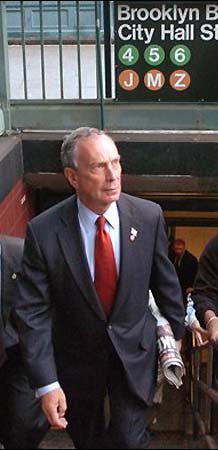
New York City Mayor Michael Bloomberg on Friday said the real estate market was slowing “dramatically” and only a “miracle” could stop soaring [mortgage rates from eating into housing prices [Reuters].](http://today.reuters.com/news/newsArticle.aspx?type=domesticNews&storyID=2006-01-20T181337Z_01_N20342890_RTRUKOC_0_US-ECONOMY-NEWYORKCITY.xml&archived=False)
>The real estate market is slowing down dramatically
>and we’re going to have a problem down the road,”
>Bloomberg said.
>
>”If people who want to sell their houses have to
>wait a longer time before someone comes along
>and buys it, it would be a miracle if prices didn’t
>start to go down,” he said.
The Reuters story referred to the [report [pdf]](https://millersamuel.com/reports/pdf-reports/PDE4Q05.pdf) I prepare for Prudential Douglas Elliman so perhaps he was referring to the sharp drop in the number of sales we saw in the fourth quarter. He said that if people have to wait longer to sell their properties, then price levels will weaken.
From a macro perspective, it seems like he is going out on a limb in [his characterization [Inman]](http://www.inman.com/blogger/2006/01/everyone-is-expert-real-estate-market.aspx), especially given his business experiences with the sensitivity of the financial markets. A statement like this could cause many in the real estate market pause and wonder what else does he see? He refers to “soaring” mortgage rates but the Fed is signaling it is near the end of its “measured increase” strategy on short term rates and long term rates have been falling since November.
From a political perspective, the city is running a large surplus ($3B) coming in part from the taxes paid by the housing sector and one could speculate he is positioning himself in the next fiscal year to lower the expectations of those who would like to spend it.
Now that the [MTA transit union fell 7 votes short of ratification [NY Post]](http://www.nypost.com/news/regionalnews/61912.htm) of the agreement hammered out by the union leaders and the city, it will be more difficult to take a hard fiscal stance with that kind of surplus.
Other local and state governments seem to be wary of housing’s impact as well: [Housing Slowdown: Impact on State Government [Calculated Risk]](http://calculatedrisk.blogspot.com/2006/01/housing-slowdown-impact-on-state.html)
[Experts say funding depends on strong real estate market [SF Chron]](http://www.sfgate.com/cgi-bin/article.cgi?f=/c/a/2006/01/16/BAGLNGNUFH1.DTL)[Late taxes hint at housing’s toll [OC Register]](http://www.ocregister.com/ocregister/money/homepage/article_949773.php)5 Comments
Comments are closed.


I think you are correct that he is positioning himself to lower expectations. Of course alot of brokers are going to be plenty p’oed at him because this will put another big crimp on their business.
As far as I am concerned I think Bloomberg is absolutely brilliant.
Finally a politician who’s not afraid to speak the truth. NY’s housing market is in for a world of pain. 10% price drops already experienced in Manhattan in 3rd quarter of 05. And the party hasnt even started. This spring will make for lots of flippers going flop.
Dummies Guide to the Housing Bubble
With all due respect to Michael Bloomberg and his many worthy accomplishments (Mayor of New York City, media mogul, billionaire, etc.) maybe he’s just jealous of all the media attention Jonathan is getting these days. ;=)
Agreed Grunt and Mr. Mason. Also, its Jonathan’s trademark orange tie – I think he is a bit miffed that he didn’t think of it first.
Mayor Bloomberg hasn’t said anything that the theories of supply & demand haven’t already proven in any economic market. He’s trying to let others know the city’s huge surplus is not to be “wasted”. He expects financial “problems” down the road and doesn’t want city & state agencies to be frivolous with this money.
On the other hand, they’ve announced a huge growth in city tourism which will only generate more money for the city. In turn, this will cause a slight increase in housing demand. Do you think all tourists come here to view the city & spend money to have a good time and not think about moving here?! Of course they do! You can take the number of tourists they expect to visit the city (millions) & take a percentage (?)of this number and add it to the amount of demand for housing in the city. I believe the demand has dwindled compared to the supply but you can stop prices from falling sharply if you increase the demand. You do that by marketing NYC so “outsiders” visit and find out they want to live here. However, there has to be available jobs & housing for these factors to work. That’s how you make cities grow!